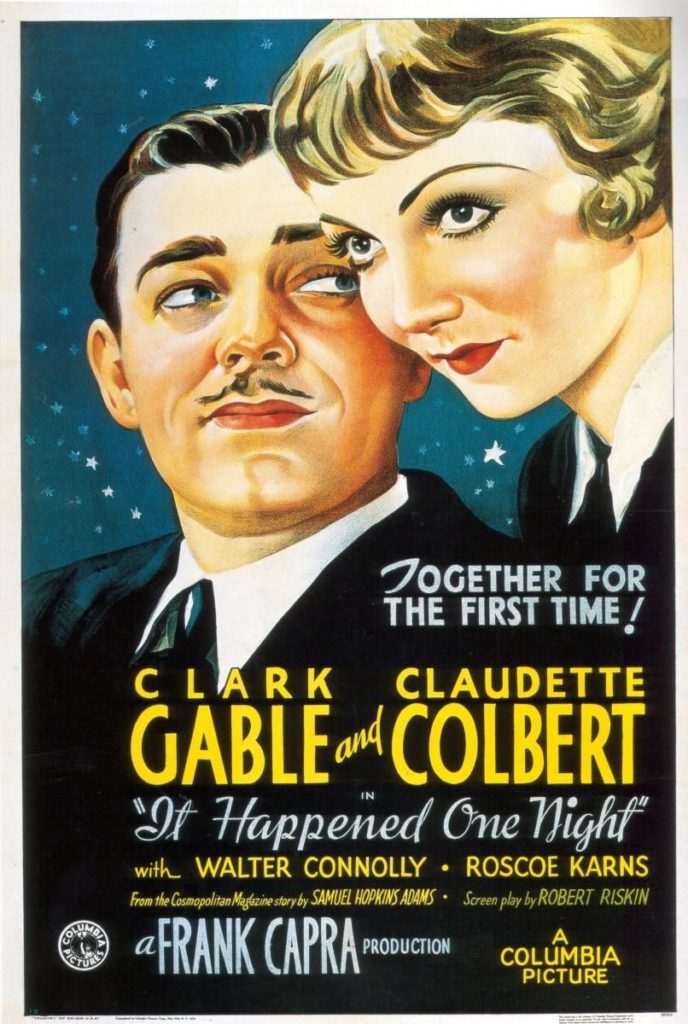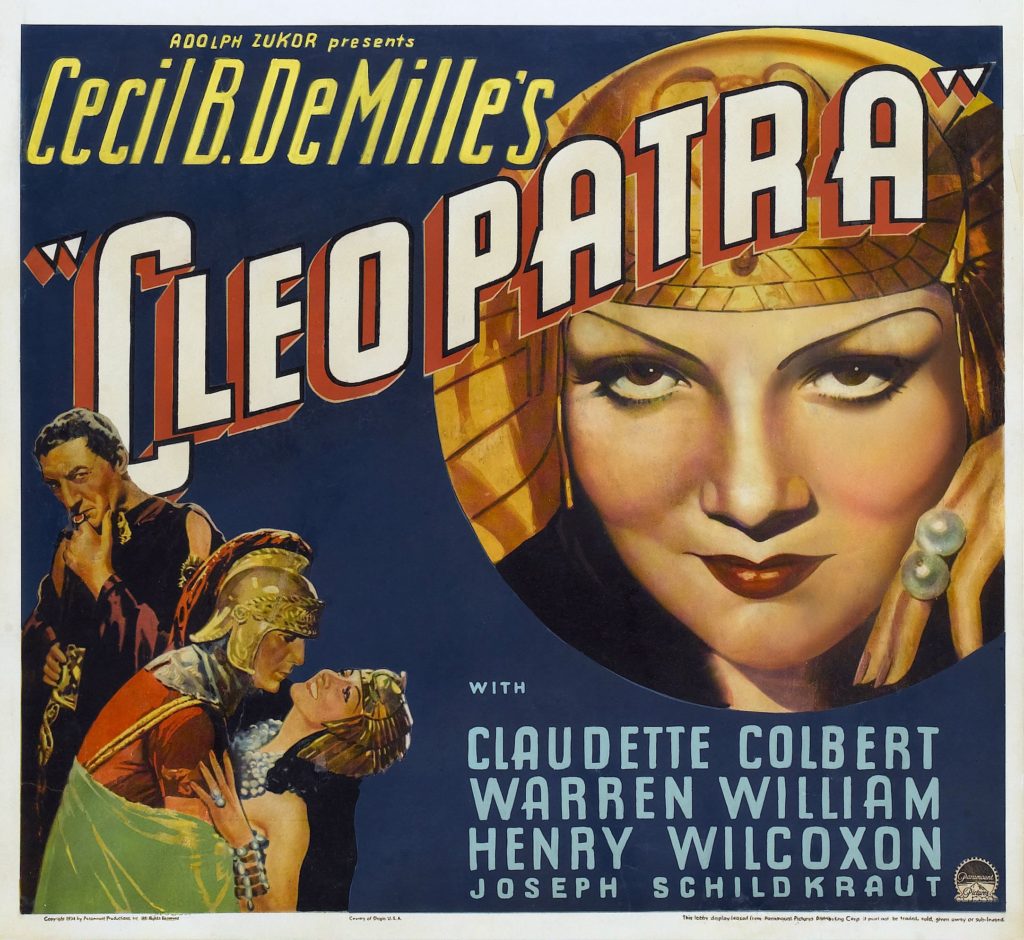1934
So… we’ve had a few years now of the Oscar going to some big serious epic drama, and the box office crown going to a goofy comedy of some sort, be it good or Eddie goddamn Cantor.
(I am not being too mean to Eddie Cantor, the only reason to have a blackface number in a movie about ancient Rome is because he wanted one.)
1934 went a different way.
And The Oscar Goes To…
Readers and regarders, we arrive at the OG screwball romantic comedy, It Happened One Night. It didn’t just take Best Picture, it was the first movie to sweep the top five categories: Picture, Director, Actor, Actress, and Screenplay. And I can see why. The script crackles, and the leads have palpable chemistry.
A runaway heiress (Claudette Colbert) meets a reporter in dire need of a big scoop (Clark Gable), and the two dislike each other immediately but find themselves stuck together in a series of mishaps and calamities as they try to make their way from Miami to New York, and no it’s not hard to figure out where this is going but it’s delightful. Sure parts of it didn’t age well… Gable’s flirtations read as aggression and even bullying at times, and they do go from strangers to soulmates in an alarmingly short timeframe, but it’s the 19-freakin’-30s, what did you expect, not everyone can be Yancey Cravat. Overall, it’s a treat, and you can see why Hollywood said “More of those forever, please.”
(Nitpick: it actually happens over most of a week, not one night, was this one of those screenplays where the studio demanded a more generic title?)
And Rotten Tomatoes Says: Hot diggity daffodil, at 98% fresh and an adjusted score of 112.267%, It Happened One Night sits at 4th place, in a top five that’s rife with recency bias if we’re being honest, so an older classic slipping in is a bit of an accomplishment.
What Would Yancey Cravat Do: Mostly just let this play out, Yancey knows better than to interfere in the course of true love. Yeah the journey got really rocky at the end but still, they got there.
The Box Office Champ
Ah yes, Elizabeth Taylor’s costume epic, one of the earliest Notoriously Troubled Productions– what’s that? Three decades too early? Huh. Then who– really? Really. Claudette Colbert again? Huh. She had a good year.
Cleopatra, who we meet being left in the desert to die by her brother’s prime minister, tries to keep herself alive and her country at least mostly unconquered by working her charms on Rome: first the all-business Julius Caesar, then the hot-tempered Marc Antony. And if you’re even slightly familiar with Shakespeare’s plays on those guys, you have a basic idea of how well this goes for her. What’s odd is that every time Rome turns on one of its Great Men, they immediately blame Cleopatra for corrupting him or turning him against Rome. Which makes the whole thing play like an epic historical slut-shaming.
Claudette Colbert puts her back into the part, and her full-court-press seduction of Mark Antony (including constant comments of “Silly me, thinking you’d go for this, you’re too clever to that”) is fun and distinct from her more desperate, flailing attempts to win over Caesar. But the last 40 minutes, when everything goes wrong for Antony and Cleopata, really drag. Including if not especially a war montage that’s only slightly more coherent than the weird montages that haunted the back third of Cavalcade. Which is to say, I honestly couldn’t tell who was winning the war for most of it.
And Rotten Tomatoes Says: Rotten Tomatoes is positive I mean the one from the 60s. But after some effort, this one turned up, and they like it more than the 60s one? Only 11 reviews, but over 80% positive.
What Would Yancey Cravat Do: Mark Antony lost the favour of Rome when he joined with Cleopatra. But no army would ever turn on Yancey Cravat. Ever.
Other Events in Film
The Hays Code, which rigidly enforced a G-rating on all things Hollywood, came into full effect in 1934. It was loosely in place ever since the arrival of sound, but was left to state legislature to enforce. Television, foreign films, and Supreme Court rulings whittled down the Code’s power, but it was definitely a Thing into the 50s or 60s. Here’s a list of content from the movies discussed thus far that wouldn’t have flown under the Code.
- Clara Bow’s breasts were exposed for about a second in Wings
- All Quiet on the Western Front had hella violence, lots of deaths, one of which was extra gruesome but only for half a second, and three of the soldiers definitely had pre-marital hanky-panky
- As did Greta Garbo and John Barrymore in Grand Hotel
- I imagine the Code cracked down on how little the Goldwyn Girls typically wore (in one scene of Roman Scandals, their “costumes” were extra-long, strategically draped wigs), and maybe that’s why Eddie Cantor’s box office dominance dried up
- Claudette Colbert and Clark Gable waited for the marriage paperwork to be in order before doing anything physical, and used Bible references as foreplay, but honestly I don’t know if even married people could be implied to be having sex in Hayes times
- And Cim Cravat, son of Yancey, married a Cherokee woman and had mixed-race kids, and that was forbidden by the Hayes Code.
Read that last one again. Note that blackface minstrel shows are nowhere to be seen on the list.
Puritan “morality” was never good.
Next Page: Art and Commerce Get Along, Film at 11



One thought on “Art Vs Commerce: Beginnings (20s/30s)”